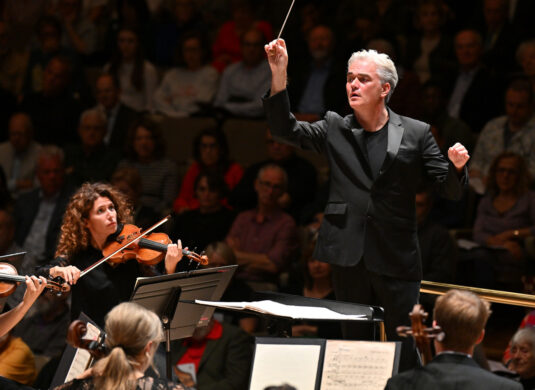 United Kingdom León, Grieg, Richard Strauss: Steven Osborne (piano), London Philharmonic Orchestra / Edward Gardner (conductor), Royal Festival Hall, London, 21.2.2025. (MBr)
United Kingdom León, Grieg, Richard Strauss: Steven Osborne (piano), London Philharmonic Orchestra / Edward Gardner (conductor), Royal Festival Hall, London, 21.2.2025. (MBr)

Tania León – Pasajes
Grieg – Piano Concerto in A minor
R. Strauss – Eine Alpensinfonie
I have never really wavered in the view that Richard Strauss’s Eine Alpensinfonie is his finest orchestral work. My guest for this London Philharmonic Orchestra concert thought the same – but came up with something else: how a bad performance of it can sometimes feel like you have been sent rather a lot of ‘tourist postcards’ of a mountain. I certainly get the allusion. This is, after all, a work in 22 separate, but co-joined sections, with titles as disparate as ‘Waterfall’, ‘At the Summit’, ‘Vision’ and ‘Before the Storm’: any successful Alpine journey needs to be a seamless one. But rather more than that, a conductor needs to get every ounce of colour out of Strauss’s vast orchestra – it is not postcards, in other words, but a vast canvas set in pictorial relief.
Fortunately, Edward Gardner, with a considerable amount of operatic highlighting, gave us a performance of drama and scale that was magnificent. And what exquisite playing he got from the orchestra, too – perhaps a little too refined in places where a certain elegance in phrasing would end up smoothing out some of the cragginess you want to hear to this piece. How far this work is more than just a picture of a mountain climb is debatable: Strauss originally wanted to call it The Antichrist, evoking his love of the anti-Christian Nietzsche. Metaphors abound in the work – to nature, but of overcoming it, of survival, and of eventual serenity and peace and that perennial Straussian architype – the Hero.
In terms of sheer atmosphere, the opening of Alpensinfonie – one of the greatest in symphonic music – is on a par with Dickens’s Bleak House: here it was just awe-inspiring – magical in its shimmering beauty, and immaculate in the brass intonation. As ‘Sunrise’ emerged with a blast on its vast chord, an orange glow of light accompanied it. Rich strings (darker in tone than I have usually encountered) accompanied an ‘Ascent’, perhaps slightly on the slower side than one normally encounters – but what majestic hunting horns one encountered along the way. A ‘Waterfall’ of almost Chopinesque brilliance had harps and a celeste trickling in unison; but how I wish Gardner how brought equal prominence to the harps at the climax to ‘On the Summit’, too (something I have only ever heard Giuseppe Sinopoli and Mariss Jansons achieve in the concert hall).
If Strauss’s ascent to the summit is often a thing of beauty, then the descent is fraught with difficulty – the mists hover, the storm begins and darkness and night return in a perfect Straussian symmetry. A performance I heard at the BBC Proms several years ago by the National Youth Orchestra of the USA made this journey down the mountain extremely harrowing – all rather dangerous as if sliding on ice, navigating craggy rockfalls and teetering on the edge during a storm of cataclysmic power. Young players, of course, can be a bit carefree in their playing – that was not quite the case here with the LPO. Careful, rather than carefree – but what a thunderstorm! This was a downpour of torrential power, a wind machine that swirled with gale force winds, a thunder sheet that shook like an earthquake, incisive timpani. It was terrific. The return of night was just as evocatively done by the orchestra as it had been at the beginning – closing a performance that had been as superb as any I have heard.
Grieg’s A minor Piano Concerto – much less often heard than one imagines given its supposed popularity – was given a wonderful workout by Steven Osborne (replacing the Russian pianist Alexandra Dovgan who had experienced visa issues– a persistent UK problem with Russian artists that seriously needs to be addressed by this government).
There was much to enjoy in this performance: wonderful rhetorical flourishes early on, and some mercurial passagework with inflections towards dance-like rhythms. The lyrical second subject was wonderfully done. Much of the virtuoso writing for this concerto (and there is a considerable amount of it) was effortlessly played by Osborne: right hand octaves, full-keyboard arpeggios (in the development section), some gorgeous accents (almost ringing like a bell in one section) and elaborate decorations in the slow movement. Osborne could add colour when the moment demanded it – by following the orchestra he often found a lovely tone palate on the keyboard (restating the original theme during the Adagio, for example).
The finale, too, an Allegro, was very exciting. Notable for Osborne’s superb handling of the dance-like sections, his dexterous finger work met all the demands with considerable ease. If Liszt was recalled (those thrilling double octaves; whole keyboard arpeggios) it was never just the case of virtuosity over interpretation.
The concert had opened with Tania León’s Pasajes (Passages), written in 2022, of which this was the European premiere. I am afraid this made little impression on me. A four section, overly long work (even at fifteen or so minutes), it partially depicts the music of Latin American and Caribbean cultures combining elements of nature (such as bird song) within it. León likened Pasajes to ‘visual art’, or ‘poetry in sounds’. The idea that music can be poetry in sounds is not a new one – indeed, it is far from being a new way of painting with a new palette (as she extends the metaphor still further). As well played as the performance was, I can’t quite see that the music and her thinking have much in common with what I was listening to.
By and large this was a great concert.
Marc Bridle
